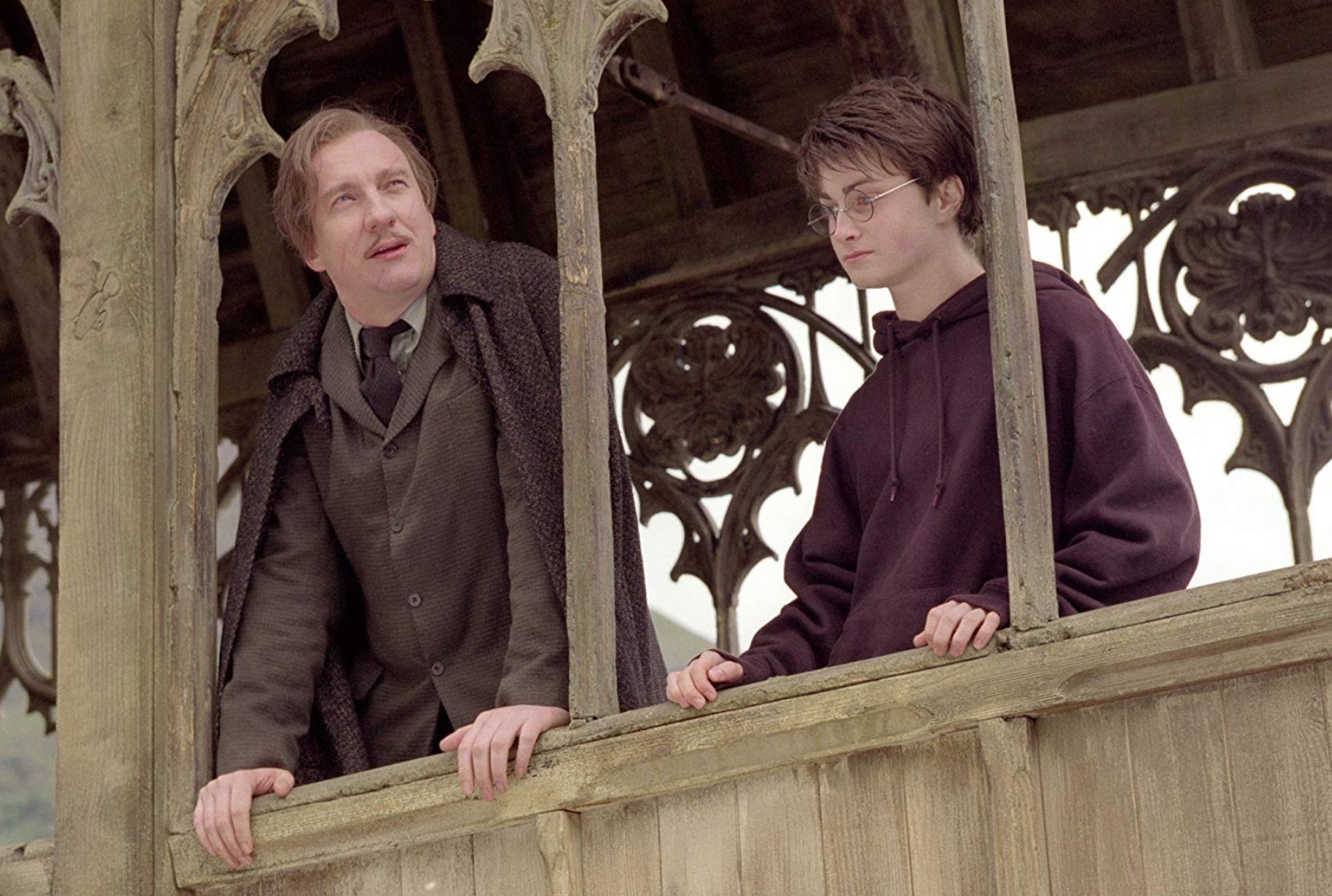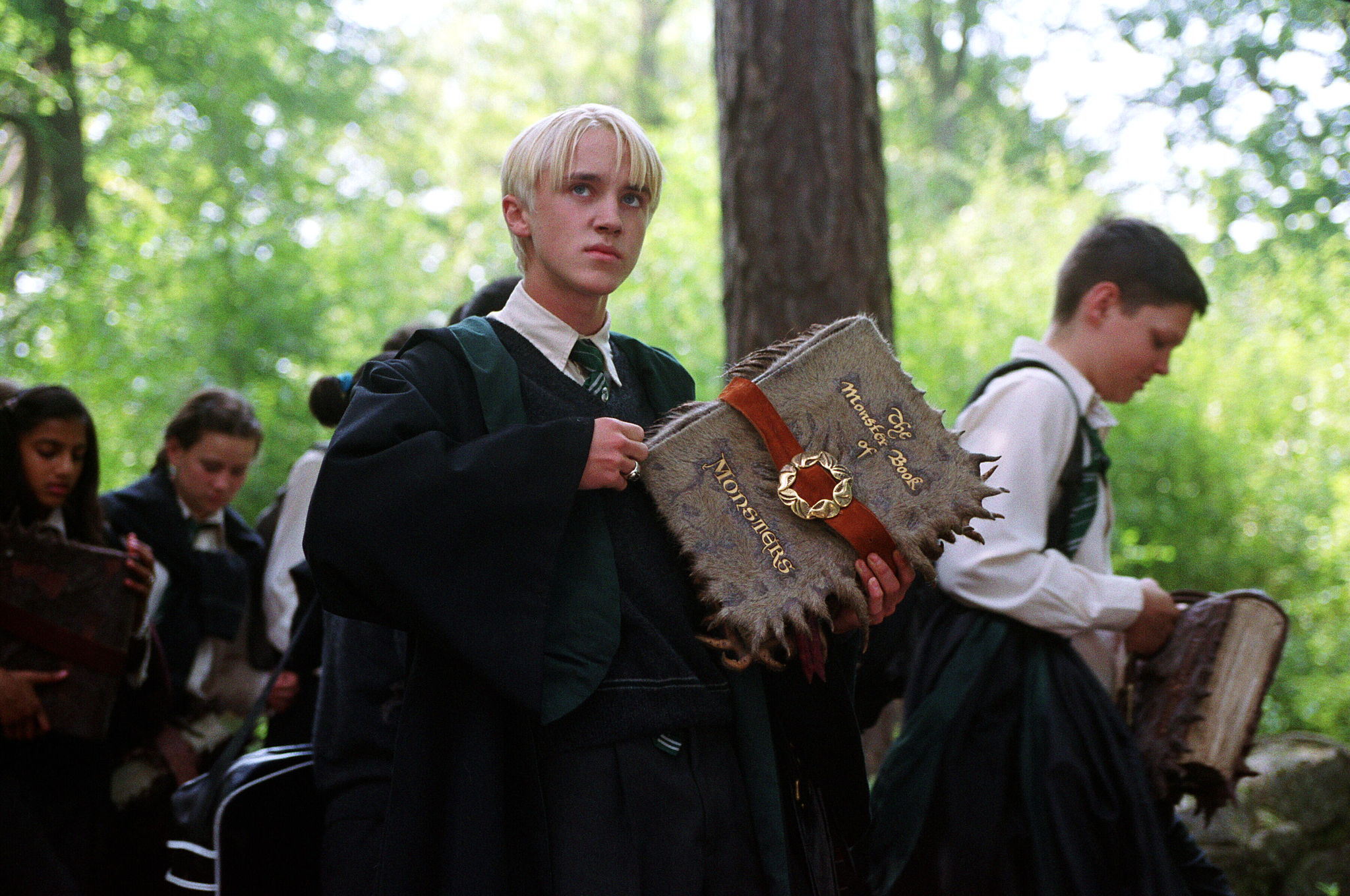Summary:
Harry Potter returns to Hogwarts School of Witchcraft and Wizardry to attend classes, only this year an escaped murderous lunatic stalks him.
My Thoughts:
This year I’m rereading the Harry Potter books for the first time in twelve years, and as I go through the books I’m also rewatching the movies. Fingers crossed I get them all done by Harry’s 39th Birthday (7/31/19). (Edit: I took a break from the wizarding world after Goblet of Fire and decided to read Dicken’s Bleak House. I’ll come back though, promise!)
As far as film adaptations of the Harry Potter movies go (or even the extended universe films- “Fantastic Beasts” and its sequel), this is the best of the lot. Funny isn’t it? When you give a magical property like Harry Potter to a director that’s proven himself as one that is abundantly competent, the result is magic.
My biggest complaints about the first two films were about the direction. Chris Colombus doesn’t know how to infuse magic into the world he helped create, nor does he know how to make his locations particularly interesting cinematically. While the first two films are closest in terms of accuracy to the books, it’s this film that captures the overall spirit in the best way possible. Yes, they did alter a few things in terms of story (and they also messed with the timeline of a few things), but Cuaron was able to give it that spark of magic that Colombus never brought. After two somnambulant entries into the series, this film simply leaps from the screen. The actors are better, the world is livelier, and the story is more complex, darker, and infinitely more compelling.
In my opinion, it’s here where Harry Potter’s story really starts to take off. The first two novels are decent books, but they’re pretty similar to the dozens of other Orphan-learns-magic storylines that populate (and pollute) YA literature. “Azkaban” is where Rowling pulled back the curtain to show us what the Wizarding World really held, and it’s also one of the tightest stories in terms of what Harry and his friends set out to accomplish during their year at Hogwarts. Simply stated, “Azkaban” is about as magical an adaptation as we could’ve hoped for.
“Something Wicked This Way Comes”
After a mass murdering wizard named Sirius Black (Gary Oldman, “Sid & Nancy”) escapes from the wizard prison Azkaban with intentions to kill Harry Potter (Daniel Radcliffe, “The Woman in Black”), Professor Dumbledore (Michael Gambon, “The Book of Eli”) orders new security measures be taken around Hogwarts School of Witchcraft and Wizardry. As Harry’s year begins, he finds himself taking classes with new teachers like Professors Lupin (David Thwelis, “Naked”), Trelawney (Emma Thompson, “In the Name of the Father”), and Hagrid (Robbie Coltrane, “Brave”), running into old rivals like Professor Snape (Alan Rickman, “Robin Hood Prince of Thieves”) and Draco Malfoy (Tom Felton, “Rise of the Planet of the Apes”), and enjoying downtime with his friends Ron (Rupert Grint, “Moonwalkers”) and Hermione (Emma Watson, “Beauty and the Beast”).
So first and foremost I want to talk more about Cuaron’s direction, which, in my opinion, is the only reason that this film is as good as it turned out to be. The film just feels so much more kinetic than the first films, and I mean that in multiple ways. For one thing, Cuaron’s sense of how to stage and pace a scene is far better; it feels as if each it scene flows into the next, where as in the first two films it felt like we were just watching a series of events with no strong connecting through-line other than Harry himself. In this film, each scene seems to have a consequence, and that consequence leads to a decision that has to be made (it’s like we’re watching a real movie!). But when I say this film is kinetic, I also mean that in terms of cinematography.
The first two films were shot in ways that seems incredibly dull when compared to this film. Most of the conversations in the first two films were shot with boring medium or two shots with flat angles; Colombus never said anything with his shots, nor did he often change the staging during shots. Cuaron is known for his crazy deep staging (I’ve talked at length about this in my reviews for “Roma” and “Y Tu Mama Tambien” if you’d like to read more), and he does not disappoint in this film at all. I actually watched this film with fellow TMM reviewer and Podcast host Michael McDonald and his wife, and while we watched we tried to count how many scenes were shot in one take; I lost count. There are so many scenes where Cuaron just allows the actors to act while the camera floats around the room, somehow capturing everything of importance while changing to say something about the characters he’s shooting.
I’ll give two examples of great one-take scenes and then we’ll move on: the first is when Arthur Weasley (Mark Williams, “Shakespeare in Love”) meets up with Harry at the Leaky Cauldron and warns him not to go looking for Black. The scene itself is rather simple; it’s just dialogue between two characters. But the way that the scene plays out is wonderful: it displays magic prominently in the background (but doesn’t focus on it to make it seem more important than it is); it has the characters move towards the camera in a way that changes the shot and the lighting multiple times (from a wide shot to a two shot to a close up, and from lighter more inviting lighting to darker more dramatic lighting), and all of those moves end up saying something about how the characters on screen feel about the interaction occurring. The other scene I wanted to mention was the scene between Lupin and Harry on the bridge where they talk about Lupin and Harry’s father James’ relationship. The camera makes only two moves (a push in and a pull out), but the shot is probably two or three minutes long, and in using this very simple move, the relationship between Lupin and Harry is shown to be at one of its strongest points here.
I love the way that Cuaron expanded Hogwarts, Hogsmede, and the Wizarding World in general. I already briefly mentioned how magic is featured in the background of the shots more prominently than it was in the first two films, and I honestly think that is what helps to infuse the magic of the books into the movies. In the first movies, Harry would stop and stare at magic like he was a kid in a candy shop, which would’ve been fine for one or two scenes as Harry gets used to the world, but that kind of spellbound approach to looking at magic doesn’t make sense for a Wizard who lives in the Wizarding world (If I were a Wizard, I wouldn’t gape openly at self-knitting knitting needles). In this film, magic is everywhere, in every corner of almost every frame; it really makes the world more of a character than it ever was in the previous entries.
In general I believe most of the acting has improved from practically everyone. While I wouldn’t say any of the three leads were horrendous in the previous two entries, it’s clear that, by this time, they’ve sort of figured out their characters a bit more, they’re a bit surer of themselves, and that makes for better performances overall (I’m sure Cuaron’s direction was a huge help too). This film also introduces two of the best characters (in my opinion) in Harry Potter universe: Lupin and Black, and both of them were cast perfectly. David Thewlis as Lupin is absolutely perfect; he constantly looks like he’s about to keel over from illness, but he still maintains his charming demeanor. Gary Oldman is absolutely wonderful as Sirius Black; the confrontation at the Shrieking Shack as totally brilliant. Alan Rickman is pretty much always great, but he seemed to have a lot more fun with Professor Snape than he did in the first two entries.
As a whole I think the climax of this film is more exciting than the first films. There seems to be more at stake, and (I guess spoiler alert) though the good guys do sort of win in the end, darkness has also won a huge victory. This is a story that hints at the darkness to come, and it does it in a way that is practically pitch perfect.
Verdict:
4.5/5 Stars might be a touch high for any Harry Potter movie, but hey, I got to this film first, so I guess that’s TMM’s official rating for this film. I’ll say this in defense of my rating: this is the best Harry Potter film out there, but I would say that there are a couple other 4/5 star Harry Potter movies; the only way to really differentiate that this one is better than those others is to give it a little bump in the rating. If I’m being 100% honest, this is a film in between a 4 and a 4.5 star rating, but if I started handing out ratings in quarter-star increments I think Michael would kill me.
As a whole I find this to easily be the most enjoyable of the Harry Potter flicks; it’s fast paced, the story is darker and more exciting, and from a cinephile perspective it actually does some cool things. While it might have deviated from the books a little bit, it also captured the spirit of the books entirely.
Review Written By:








